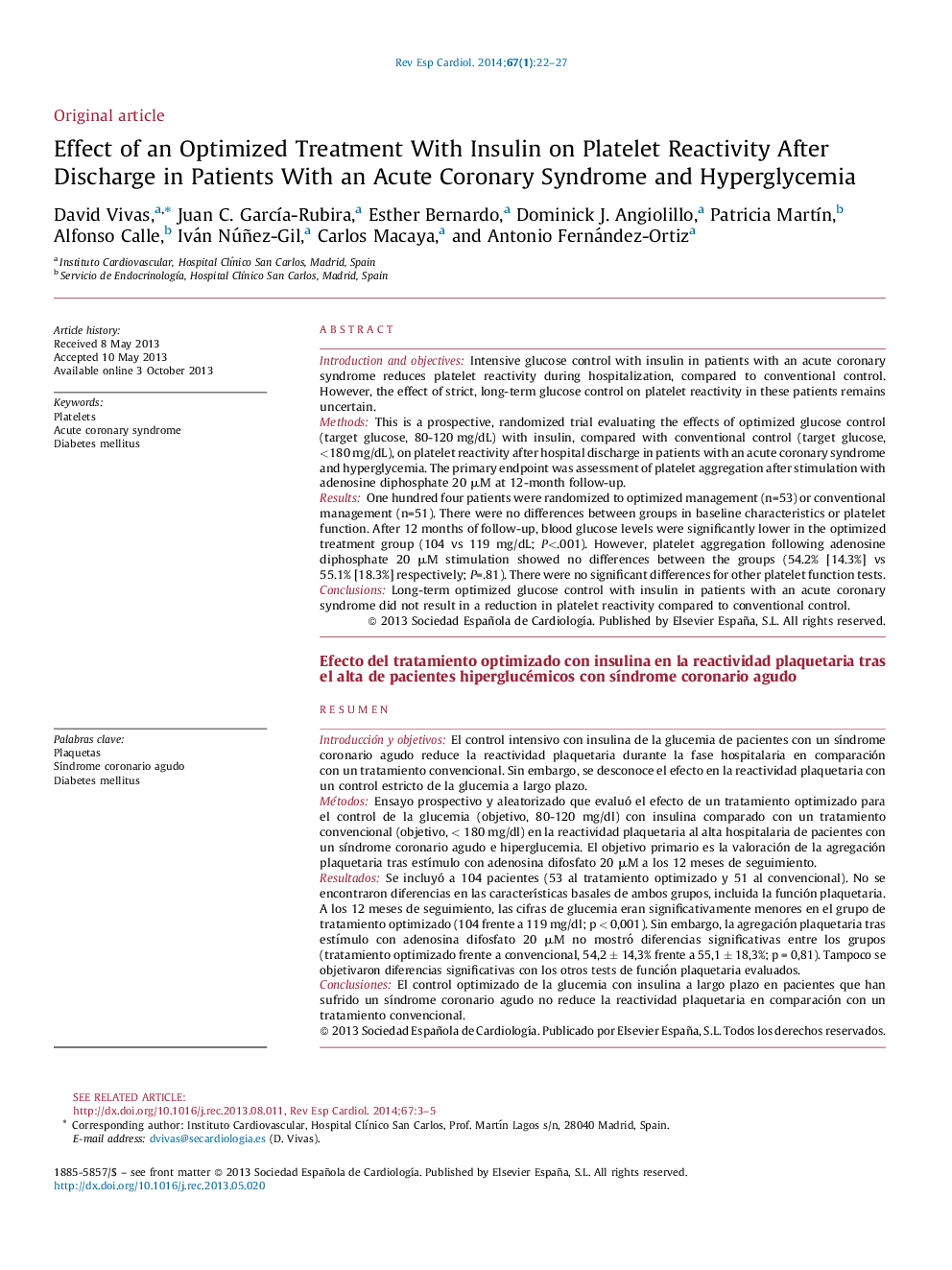| کد مقاله | کد نشریه | سال انتشار | مقاله انگلیسی | نسخه تمام متن |
|---|---|---|---|---|
| 3017642 | 1182127 | 2014 | 6 صفحه PDF | دانلود رایگان |
Introduction and objectivesIntensive glucose control with insulin in patients with an acute coronary syndrome reduces platelet reactivity during hospitalization, compared to conventional control. However, the effect of strict, long-term glucose control on platelet reactivity in these patients remains uncertain.MethodsThis is a prospective, randomized trial evaluating the effects of optimized glucose control (target glucose, 80-120 mg/dL) with insulin, compared with conventional control (target glucose, <180 mg/dL), on platelet reactivity after hospital discharge in patients with an acute coronary syndrome and hyperglycemia. The primary endpoint was assessment of platelet aggregation after stimulation with adenosine diphosphate 20 μM at 12-month follow-up.ResultsOne hundred four patients were randomized to optimized management (n=53) or conventional management (n=51). There were no differences between groups in baseline characteristics or platelet function. After 12 months of follow-up, blood glucose levels were significantly lower in the optimized treatment group (104 vs 119 mg/dL; P<.001). However, platelet aggregation following adenosine diphosphate 20 μM stimulation showed no differences between the groups (54.2% [14.3%] vs 55.1% [18.3%] respectively; P=.81). There were no significant differences for other platelet function tests.ConclusionsLong-term optimized glucose control with insulin in patients with an acute coronary syndrome did not result in a reduction in platelet reactivity compared to conventional control.
ResumenIntroducción y objetivosEl control intensivo con insulina de la glucemia de pacientes con un síndrome coronario agudo reduce la reactividad plaquetaria durante la fase hospitalaria en comparación con un tratamiento convencional. Sin embargo, se desconoce el efecto en la reactividad plaquetaria con un control estricto de la glucemia a largo plazo.MétodosEnsayo prospectivo y aleatorizado que evaluó el efecto de un tratamiento optimizado para el control de la glucemia (objetivo, 80-120 mg/dl) con insulina comparado con un tratamiento convencional (objetivo, < 180 mg/dl) en la reactividad plaquetaria al alta hospitalaria de pacientes con un síndrome coronario agudo e hiperglucemia. El objetivo primario es la valoración de la agregación plaquetaria tras estímulo con adenosina difosfato 20 μM a los 12 meses de seguimiento.ResultadosSe incluyó a 104 pacientes (53 al tratamiento optimizado y 51 al convencional). No se encontraron diferencias en las características basales de ambos grupos, incluida la función plaquetaria. A los 12 meses de seguimiento, las cifras de glucemia eran significativamente menores en el grupo de tratamiento optimizado (104 frente a 119 mg/dl; p < 0,001). Sin embargo, la agregación plaquetaria tras estímulo con adenosina difosfato 20 μM no mostró diferencias significativas entre los grupos (tratamiento optimizado frente a convencional, 54,2 ± 14,3% frente a 55,1 ± 18,3%; p = 0,81). Tampoco se objetivaron diferencias significativas con los otros tests de función plaquetaria evaluados.ConclusionesEl control optimizado de la glucemia con insulina a largo plazo en pacientes que han sufrido un síndrome coronario agudo no reduce la reactividad plaquetaria en comparación con un tratamiento convencional.
Journal: Revista Española de Cardiología (English Edition) - Volume 67, Issue 1, January 2014, Pages 22–27
